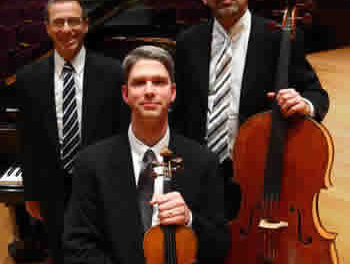The presence of two internationally renowned musicians among the Eastern Music Festival‘s faculty helped bring out a bevy of music lovers to Guilford College‘s Dana Auditorium to hear an eclectic program.
It was quite a coup for the festival to get pianist Awadagin Pratt, a frequent soloist in our region, on this summer’s faculty. Cellist Lynn Harrell has long been a popular guest soloist with many of the state’s orchestras. The concert opened with two ideal and rarely programed works followed by one of the most beloved of the five great piano quintets.
A short four-minute work for a pair of cellos, “Julie-O” (1988), by Mark Summer (1958- ) opened the concert. Cellist and composer Summer is a founding member of the innovative Turtle Island String Quartet where he helped shape their sound, such as developing percussive and other techniques for strings. “Julie-O” began as a solo cello work that Summer later adapted for two cellos. The title comes from the nickname the composer’s brother called their younger sister. The work makes extensive use of novel pizzicato and percussive techniques along with imaginative rhythms. Players take it in turn to accompany the other melodic line as well as merging together.
Danielle Guideri and Rebecca Zimmerman played with considerable gusto. Their intonation was excellent as they delved into an extraordinarily wide tonal range. Improvisation added to the excitement of their performance.
There seemed to be little limit to the broad range of talent of Romanian born Georges Enescu (1881-1958). He was a brilliant violinist, an accomplished pianist, a respected conductor, an inspiring teacher, and a skillful composer. His complete mastery of instrumental writing was on constant display throughout his early Dixtuor in D, Op. 14 (1908). It is scored for oboe, English horn, and pairs of flutes, clarinets, bassoons, and horns. Enescu exploits the full gamut of individual and ensemble tonal colors. The composer’s melodies are a constant delight and so is his ingenious contrapuntal treatment of them.
The ensemble consisted of flutists Les Roettges and Jonathan Baumgarten, oboist Randall Ellis, Karen Birch Blundell on English horn, clarinetists Shannon Scott and Anthony Taylor, bassoonists George Sakakeeny and Karla Ekholm, and Joy Branagan and Andrew McAfee on horns. The performers met all of Enescu’s demands with great panache and style. The interplay of individual colors and the juxtaposition of various pairings and blendings were an unending source of pleasure.
There are five great piano quintets: Brahms’ Op. 34, Schumann’s Op. 44, Franck’s Op. 57, Shostakovich’s Op. 57, and Antonín Dvořák’s Quintet in A, Op. 81. Dvořák’s ebullient and sunny piece is much beloved. It is in four movements. The cello sounds a somber theme that is taken up by the other players before being greatly modified and transformed. The second subject is first meltingly spun by the viola. The episodic slow movement is a “Dumka” which alternates abrupt changes of mood, a sad theme in the strings, a vigorous central episode, and a gorgeous melody first played by the pair of violins. The third movement is labelled a “Furiant” but is really a tuneful fast waltz. Its skipping theme undergoes imaginative transformations. The finale is an ebullient sonata-rondo which pairs its gruff opening with a spirited extension as running quavers.
Dvořák’s Quintet received a fiery, no-holds-barred performance from pianist Awadagin Pratt, violinists EMF concertmaster Jeffrey Multer and GSO concertmaster John Fadial, EMF associate principal violist Meredith Crawford, and the guest soloist for the July 11 concert, Lynn Harrell. Their intonation, timbre, and wide-ranging dynamics were wonderful as were their responses to the composer’s quicksilver changes. Pratt’s delicate control of stylish rubato added so much to this richly rewarding performance in which the musicians sheer joy in music making was palpable.
Harrell will be featured as soloist in Richard Strauss’ Don Quixote as part of the July 11th professional Eastern Festival Orchestra Concert. Mahler rarities Symphony No. 6 and Symphony No. 7 will be tackled by the two student orchestras July 9 and 10 respectively. For more information on the Eastern Music Festival, see the sidebar.











